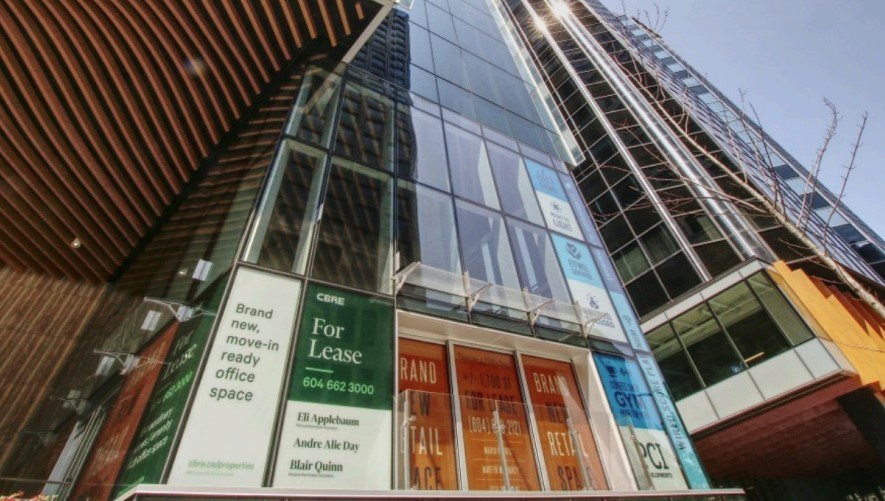While other notable North American cities struggle with persistent vacancies, Vancouver’s office market is bucking the trend.
The city’s office asset class outperforms other major cities due to a combination of factors, including cautious financing of development, a non-head-office designation, competitive labour costs and even policies enacted by the Trump administration, according to those who spoke to BIV.
Vancouver’s downtown office vacancy rate decreased by two per cent to 14 per cent as of the first quarter of 2024. This is historically high compared to Vancouver’s pre-pandemic downtown vacancy rate of 2.1 per cent in the first quarter of 2020, according to Cushman & Wakefield.
“Despite the fact that our vacancy rate isn’t as high as other markets, it’s still the first tenants’ market that we’ve had in 20 years. So, from a tenant’s perspective, this is a phenomenal time to be thinking about space,” says Colin Scarlett, vice-chair of the Vancouver brokerage at Colliers Canada.
Vancouver has the lowest office vacancy rate among major markets in North America and had the highest asking gross rent in Canada at $55.15 per square foot in the first quarter of this year, according to Svetlana Lebedeva, research manager at Cushman & Wakefield.
There are just over 70 full vacant floors in the downtown core available for lease on a direct basis, according to Cushman & Wakefield.
However, data from NAI Commercial shows that there are 166 full-floor vacancies greater than 10,000 square feet, as well as 32 spaces between 7,000 square feet and 10,000 square feet that are vacant full floors.
Just south of the border, Seattle’s vacancy rate increased from 24 per cent to 26.6 per cent in Q1 2024, according to Cushman & Wakefield.
The U.S. had an overall office vacancy rate of 20.2 per cent during the same quarter—higher than Canada’s overall vacancy rate of 17.1 per cent.
“Part of the reason why our office market is doing very well relative to the rest of the world or in North America is we’re a diverse economy, but also we’re not a big head-office city,” says Alain Rivère, vice-president of the High Technology Facilities Group with CBRE.
“Any one company, on average, won’t have a huge impact on the market,” he says, adding that if one company downsizes, “it’s not going to have a material impact.”
The way that new office space is funded also plays into the resiliency of the market, according to Scarlett.
“Developers in Canada are much more measured with their willingness to take on risk. Whereas in the U.S., there seems to be a greater willingness to take on risk when it comes to construction,” he says.
“We generally need a large pre-lease commitment in Vancouver before a landlord is going to develop whereas in the U.S., it’s not quite the same.”
In Canada, developers have to navigate full-recourse debt, meaning the lender has the right to tap into a borrower’s assets in the event of a loan default.
“Because of that, developers are much more cautious,” Scarlett says. “If you look at supply and demand, the supply has increased in Vancouver, but it hasn’t increased at the same speed at which it’s increased in some of the U.S. markets, which I think is the reason why our vacancy rate is a little lower and therefore our market bit more resilient.”

The policies of former U.S. president Donald Trump are another factor that contributed to the strength and resiliency of Vancouver’s office market.
In 2020, Trump suspended H-1B and other temporary visas, which allow international students and highly skilled workers to enter the U.S.
“When Trump ended the H-1B visa program, U.S. tech looked to Canada generally and Vancouver specifically as a way to nearshore global talent that couldn’t work in the U.S.,” says Scarlett, adding that more activity in the market meant more demand.
This especially benefitted companies headquartered in nearby Seattle, such as Microsoft Corp. and Amazon.com Inc., which hired global talent in Vancouver, according to Scarlett.
“If Donald Trump wins the next U.S. election, Vancouver’s office market will continue to be strong because of that labour dynamic,” he says.
The cost of labour in Canada also contributes to the strength of the city’s office market, according to Scarlett.
“We have found some large U.S. companies have located in Canada because they’re able to secure a pool of labour that is more suitable to their needs. And they have found that by locating in Canada, they’re able to achieve that,” says Andrew Petrozzi, director and head of Canada research for Newmark Group Inc.
He adds that this dynamic also benefits other Canadian office markets like Toronto and Calgary, not just Vancouver.
However, productivity issues in Canada have increased relative unit labour costs by roughly five per cent, said Nathan Janzen, assistant chief economist at RBC, in a Feb. 28 report.
“That makes Canadian production relatively more expensive and erodes competitiveness,” he said in the report.
Lower labour costs are more pronounced in Vancouver’s technology industry, according to Petrozzi.
Technology workers in the U.S. are paid on average 46 per cent more than technology workers in Canada, which is equivalent to an almost $40,000 difference, according to an October 2023 study from Toronto Metropolitan University.
Vancouver’s technology industry employed roughly 111,100 individuals in 2022, according to July 2023 data from CBRE.
“That lesser cost of labour is typically associated with tech labour, we generally tend to pay our programmers less than what they would get paid in, say, Seattle or in San Francisco,” Petrozzi says.
Scarlett says that there are “some larger international firms” within the technology industry that are currently looking at the Vancouver market. He declined to specify which companies.
“All the same factors that made Vancouver a great office market pre-COVID, and the choice of many large U.S. companies, are still in place right now. Except now, there are even more high-quality options of a variety of sizes available, particularly in the downtown core,” says Petrozzi.
This article was originally published in Office Space Magazine.






